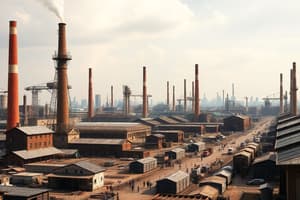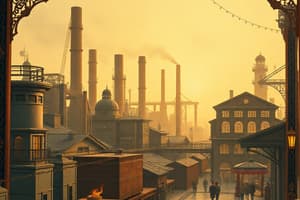Podcast
Questions and Answers
Match the following terms related to Industrialization with their definitions:
Match the following terms related to Industrialization with their definitions:
Monopoly = A market structure where a single company dominates the market Labor unions = Organizations formed by workers to advocate for better conditions Urbanization = The process where an increasing population lives in cities Robber barons = Businessmen who used exploitative practices to amass wealth
Match the following concepts related to Immigration & Race Relations:
Match the following concepts related to Immigration & Race Relations:
Assimilation = The process by which immigrants adopt new cultural norms Push factors = Conditions that drive people to leave their home country Jim Crow laws = Laws enforcing racial segregation in the Southern U.S. Nativism = Protecting the interests of native-born against immigrants
Match the following events or legislations in the West:
Match the following events or legislations in the West:
Homestead Act = Provided free land to settlers in the West Dawes Act = Divided tribal lands into individual plots for assimilation Transcontinental railroads = Connected eastern and western parts of the U.S. Indian reservations = Areas of land designated for Native Americans
Match the following concepts from the Gilded Age:
Match the following concepts from the Gilded Age:
Match the following terms related to Imperialism:
Match the following terms related to Imperialism:
Match the following interpretations of Industrialization:
Match the following interpretations of Industrialization:
Match the following legal cases or decisions with their descriptions:
Match the following legal cases or decisions with their descriptions:
Match the following strategies related to Labor Relations:
Match the following strategies related to Labor Relations:
Match the following terms with their impact during Urbanization:
Match the following terms with their impact during Urbanization:
Match the following movements with their objectives:
Match the following movements with their objectives:
Match the following terms with their definitions:
Match the following terms with their definitions:
Match the following historical events with their descriptions:
Match the following historical events with their descriptions:
Match the following movements with their characteristics:
Match the following movements with their characteristics:
Match the following policies with their proponents:
Match the following policies with their proponents:
Match the following concepts with their focus areas:
Match the following concepts with their focus areas:
Match the following terms with their impacts:
Match the following terms with their impacts:
Match the following key historical figures with their actions:
Match the following key historical figures with their actions:
Match the following periods with their key characteristics:
Match the following periods with their key characteristics:
Match the following protections with their goals:
Match the following protections with their goals:
Match the following reforms with their contexts:
Match the following reforms with their contexts:
Flashcards
Laissez-faire
Laissez-faire
An economic system where the government doesn't interfere with businesses.
Monopoly
Monopoly
A market controlled by a single company, eliminating competition.
Robber Barons
Robber Barons
Powerful businesspeople who used ruthless tactics to make money in the 19th century.
Labor Unions
Labor Unions
Signup and view all the flashcards
Urbanization
Urbanization
Signup and view all the flashcards
Tenements
Tenements
Signup and view all the flashcards
Push Factors
Push Factors
Signup and view all the flashcards
Pull Factors
Pull Factors
Signup and view all the flashcards
Homestead Act
Homestead Act
Signup and view all the flashcards
Transcontinental Railroads
Transcontinental Railroads
Signup and view all the flashcards
Big Stick Policy
Big Stick Policy
Signup and view all the flashcards
Great Depression
Great Depression
Signup and view all the flashcards
Harlem Renaissance
Harlem Renaissance
Signup and view all the flashcards
New Deal
New Deal
Signup and view all the flashcards
Prohibition
Prohibition
Signup and view all the flashcards
Nativism
Nativism
Signup and view all the flashcards
Governmental Reforms
Governmental Reforms
Signup and view all the flashcards
Home Front Mobilization
Home Front Mobilization
Signup and view all the flashcards
American Entry Into WWI
American Entry Into WWI
Signup and view all the flashcards
Wilson's Fourteen Points
Wilson's Fourteen Points
Signup and view all the flashcards
Study Notes
Industrialization
- Laissez-faire: Economic system with minimal government intervention in business.
- Monopoly: Market dominated by a single company, eliminating competition.
- Robber barons: 19th-century businessmen who used exploitative practices to gain wealth.
- Captains of industry: Business leaders who positively impacted industrial growth.
- Labor unions: Worker organizations advocating for better working conditions and rights.
- Urbanization: Increasing population shifting to cities.
- Tenements: Overcrowded, poorly maintained apartment buildings in urban areas.
Immigration & Race Relations
- Push factors: Conditions driving people to leave their countries.
- Pull factors: Conditions attracting people to a new country.
- Assimilation: Process of immigrants adopting new country's culture.
- Nativism: Policy protecting native-born citizens against immigrants.
- Jim Crow laws: Southern U.S. laws enforcing racial segregation.
- Plessy v. Ferguson: Supreme Court case upholding "separate but equal" segregation.
The West
- Homestead Act: Provided free land to settlers in the West for farming.
- Transcontinental railroads: Connected eastern and western U.S. by rail.
- Indian reservations: Designated land areas for Native Americans.
- Dawes Act: Attempted to assimilate Native Americans by dividing tribal lands.
Gilded Age
- Social Darwinism: Belief that the fittest survive in social and economic competition.
- Patronage: Giving government jobs to political supporters.
- Civil service: System of hiring government employees based on merit.
- Gospel of Wealth: Wealthy's responsibility to improve society.
- Social Gospel: Applying Christian ethics to social problems.
- Populist Movement: Political movement advocating for the common person.
Imperialism
- Yellow journalism: Sensationalized news for readers' attention.
- Spanish-American War: Conflict leading to U.S. territorial gains.
- Anti-imperialists: Opponents of American expansion.
- Big Stick policy: Theodore Roosevelt's foreign policy emphasizing negotiation with force.
Progressivism
- Political parties: Groups with similar political goals.
- Governmental reforms: Changes to improve government efficiency and fairness.
- Business reforms: Regulations for fair and safe business practices.
- Consumer protections: Laws ensuring consumer rights.
- Environmental protections: Efforts to preserve resources and reduce pollution.
World War I
- American entry: Reasons for U.S. involvement.
- Home front mobilization: Domestic efforts supporting the war.
- Civil liberties: Protected individual rights.
- Wilson’s Fourteen Points: President Wilson's post-war peace plan.
The Roaring 1920s
- Nativism: Policy protecting native-born citizens.
- Prohibition: Illegal production & sale of alcohol.
- Consumerism: Promotion of consumption and spending.
- Harlem Renaissance: African American cultural movement in Harlem.
Depression & New Deal
- Great Depression: Severe worldwide economic crisis.
- Hoover’s responses: Measures taken by President Hoover to deal with the Depression.
- New Deal: Programs and policies addressing the Depression.
- Impact of Depression & ND: Effects of the Depression and New Deal on society and the economy.
Studying That Suits You
Use AI to generate personalized quizzes and flashcards to suit your learning preferences.




